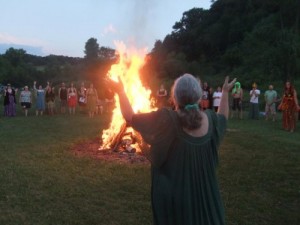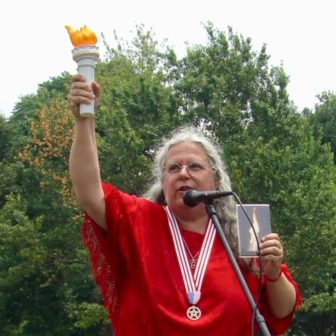TWH – Religious freedom for minority faiths remains challenging around the world; but despite constitutional protections against discrimination, the challenge remains in the USA as well. An employee allegedly being fired for being “Pagan,” the proposed removal of books from state-funded schools, and public book burnings held by a right-wing evangelical pastor due to the book’s content of alleged witchcraft and sorcery, have all been in the news in the past year.
These tread on the threshold of violating the First Amendment of the U.S. Constitution, as well as the separation of church and state, and they have become increasingly common. Even within the legal system, there is at least one Bible in every courtroom in America for swearing in witnesses.
Advocacy for Paganism is no easy feat. Discrimination through housing, job security, and community retaliation are only some of the potential pressures that advocates for minority religions face in the fight for equality in the eyes of Freedom of Religion.
Last month, Grady Newsource published an article about a Pagan group in Athens, Georgia that is continuing its work in advocating for religious freedom. TWH reached out to the group and two other Witches that have made religious freedom and Pagan rights a cornerstone of their practices.
The advocacy of simply existing
“We advocate for religious freedom by simply existing,” said Jim Grimes, a founding member of the Athens Area Pagans.
The Athens Area Pagans group, now a nonprofit organization and religious organization, started in 2005 in Athens, Georgia, and has become a source of freedom and comfort for its members and aims to help local Pagans obtain the resources they need, whatever their path.
“We met at the botanical gardens in 2005, and we have met every Saturday at 5 p.m. since,” said Grimes.
Grimes, former lawyer, and journalist described himself as an “eclectic Pagan” who has traversed the religious spectrum from Baptist to atheist but found resonance within the Pagan community.
Grimes describes the Pagan community as more of a “Broadened term” as many different belief systems fit under the term and the group welcomes Pagans of all Paths in the area.
The group also is responsible for Athens Pagan Pride Day, a part of the Pagan Pride Project, in which “Activism, Charity, Education, and Community” is the mission focus, fostering pride in Pagan identity.
According to the group the Pagan Pride Project also promotes tolerance and understanding between different belief systems, helps present a clearer understanding of Pagan practice, as well as dispelling misconceptions, and draws political attention to Paganism.
As the group’s focus is visibility and pride in identity, in order to participate in the Pagan Pride Day three requirements must be met.
-
- Must be ok with Public Ritual – as three will be held.
- Participate in the food drive, which will be donated to a local organization.
- Must be ok with Press, social media, and local news.
“Being there and being in the public is important,” said Grimes. “It’s about refusing to hide and being out there in the public.”
Grimes also spoke of the group experiencing discrimination when the group tried to rent out a space for a retail store. The retail location, formerly a strip club, was deemed “inconsistent with the character of the neighborhood” according to Grimes, after the word Pagan was used.
“It’s subtle things they do,” said Grimes. “It’s hard to prove that anything is wrong.”
Grimes also said that the Athens community is welcoming overall, despite a few protestors at a Pride Day event once.
The group has purchased around 49 acres of land in Clarke County for a proposed intentional community named AllWays, with hopes to provide religious infrastructure and support to Pagans in the area. The group is also raising money to apply for permits, build structures add infrastructure, and personal dwellings onsite.
A Lifetime of Advocacy
As the advocacy for freedom of religion has once again gained traction, there are those that have never given up. Those that choose creative ways to ensure this right and those who fight by simply just embracing their Pagan community.
“In 1974, I founded Circle Sanctuary, and it became one of the first Pagan communities to obtain state and federal legal status as a non-profit religious organization in the USA. Taking this institutional approach has aided us in Pagan religious freedom work.”
Reverend Selena Fox, Executive Director of Lady Liberty League, and High Priestess of the Circle Sanctuary has been a staunch advocate for paganism and religious freedom for almost 50 years.

Selena Fox of Circle Sanctuary leading a Lammas bonfire ritual.
Throughout her career, through both the Circle Sanctuary and Lady Liberty League, founded in 1985, the group successfully defeated, through protest and action, the anti-Wiccan amendment (amendment 705) to the Postal Appropriations Bill (HR 3036) presented by Senator Jesse Helms.
According to congressional records, the amendment to the Postal Service and General Government Appropriations Bill, of 1986, proposed by Helms, would guarantee that funds appropriated under the Act would not be used to grant, maintain, or allow tax exemptions to any cult, organization, or group that has any interest in, the promoting of satanism or witchcraft.
Fortunately, the legislation and two other proposed legislations at the time ultimately did not pass but most Wiccan and Pagan groups today obtain exempt status by applying for non-profit 501(c)(3) status, instead of the formal religious exemption status as the process is extremely difficult to obtain and navigate and contains many obstacles via the Internal Revenue Service.
The Circle Sanctuary has been a major player in the advocacy for religious freedom since the organization’s founding in 1974. Fox, has played a major role herself, not only advocating for religious freedom but also taking on civil rights and advocating for the LGBTQI community.
“Circle Sanctuary and I also have been involved in interfaith social justice work since our beginnings, and allyship with organizations, communities, and individuals of many beliefs also has helped in our work for Pagan civil rights and religious freedom.”
The fight for religious freedom has also come with costs. Issues of safety, acts of humiliation, ridicule, and judgment are just a few of the barriers groups like Fox’s deal with to practice their religion in peace.
Fox spoke of an event in the early 90s that was fraught with backlash but ultimately opened a door so that the community and other organizations could get a better understanding of the Pagan community and diverse practices.
“In 1992, Circle Sanctuary and I had to take action to protect our Samhain events in Madison, Wisconsin, and at our land which were being targeted by an anti-Pagan televangelist,” said Fox. “I got restraining orders from judges in two counties and worked with five area police departments for protection. We succeeded in holding all our Samhain observances without interference, and the publicity connected with this won us multifaith support in the local area as well as helped dispel, misinformation about Paganism.”

Selena Fox holds the Liberty Torch in 2007 – Image credit: S. Fox
Fox continues her work fighting against religious discrimination and intolerance today and is considered by many to be one of the founders of the modern Pagan movement, specifically in the fight to allow the pentagram on Veterans’ tombstones in which, she and the Lady Liberty League triumphed in 2007 after a ten-year-long battle with Veterans Affairs.
Interfaith Work and Visibility
H. Byron Ballard of Asheville, North Carolina advocates for religious freedom through interfaith works and community outreach. Ballard, a Witch, writer, avid gardener, community advocate, and founding member and ritualist for Mother Grove Goddess Temple chooses to advocate by being visible to the community by reaching out to media members, and public speaking.
“I advocate for Pagans in the community, through interfaith work and other visibility. Creating public rituals and other events to make a space for practitioners of alternative spiritualities, and speaking to media locally, regionally, nationally,” said Ballard.

Byron Ballard – Courtesy
Ballard also advocates not only for her community of Pagans but all Pagans and the rights guaranteed to all U.S. citizens under the Constitution. Founding a Pagan community in Asheville many years ago, she has fought to bring hope to those who practice Pagan beliefs while also walking the line of visibility and safety in a dominant Christian region of the country.
“I want all US citizens to enjoy all the rights that our Constitution and Bill of Rights provide us. I want my co-religionists (and myself) to be safe in our places of worship and in our lives. I want people to understand that there are alternatives to the Abrahamic religions that dominate much of the planet,” said Ballard.
Ballard understands that navigating the waters of religious freedom can be difficult as many stereotypes exist concerning Pagans, especially in the Bible Belt of America.
“As a Pagan, a witch, and an Appalachian woman I am tired of stereotypes that belittle and disrespect people who are just trying to live an authentic spiritual life,” said Ballard.
Ballard continues with education for and with her community in Asheville and hopes to ultimately strengthen the community with other like-minded people.
“What I expect our work to do is strengthen our community and make us more resilient, to keep us safe under the weight of the dominant (and dominating) culture, and to allow us to express the joy of an Earth-centered animistic path without fear of retribution from the ignorant and violent,” said Ballard.
Though strength is often found in numbers, Ballard understands that education against stereotypes and being labeled “others” will take time. “I expect that all of this is an ongoing process and I hope that our work will encourage others, especially the next generations,” said Ballard.
Ballard hopes the next generation will “continue our work and add their own vision to what it means to walk a Pagan path.”
The road is still long and winding in the fight for religious freedom, and advocacy plays an important part. No matter the form of advocacy, visibility, education, community, and activism still play a major role in the fight for recognition in a world dominated by those religions of the Abrahamic Law Code. Though Pagans seem speckled amongst the landscape, there has been a rise in numbers in the past decade which open new doorways and paths in the fight for religious freedom here in the United States.
The Wild Hunt is not responsible for links to external content.
To join a conversation on this post:
Visit our The Wild Hunt subreddit! Point your favorite browser to https://www.reddit.com/r/The_Wild_Hunt_News/, then click “JOIN”. Make sure to click the bell, too, to be notified of new articles posted to our subreddit.
